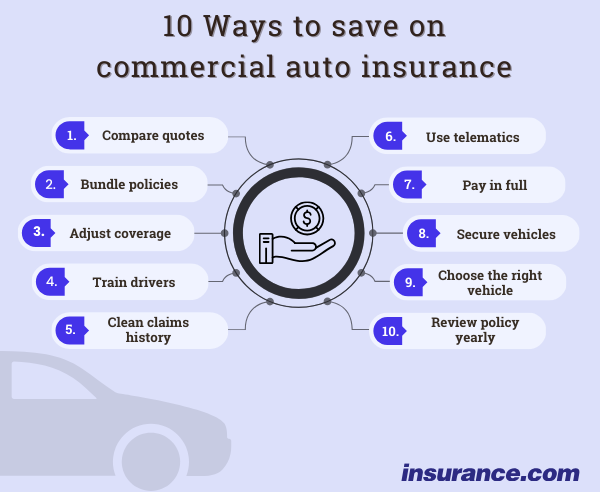10 tips to save on commercial auto insurance
Commercial auto insurance rates vary based on the insurer, the makes and models you insure, the number of vehicles you have and other factors, but, according to small-business insurance broker Insureon, the average monthly price of commercial auto is $147 per vehicle.
However, as with personal car insurance, there are ways to lower insurance rates to get low-cost commercial auto insurance:
1. Shop around and compare quotes
As a business owner, you have a lot on your mind – and on your to-do list. It's easy to maintain the status quo and stick to one insurer, so it may have been some time since you shopped around for coverage.
However, rates and coverage options can vary significantly by insurer, so it's a good idea to request quotes at least once per year.
While you can always manually shop around on your own, working with a professional may be more effective.
"The agency or broker takes all of the legwork, all of the homework, off your plate, and they present you with the best options," says Erika Tortorici, founder and principal of Optimum Insurance Solutions, an insurance agency in Massachusetts
Plus, an insurance agent or broker can provide their expertise, connect you with insurance companies that specialize in your field and help you find the best rates without adding to your costs.
"While I can't speak for every agency, I can say mine – and many others – doesn't charge the client any fees," said Tortorici. "Instead, the carrier pays us directly."
If you’re wondering where to start shopping for a carrier, Insurance.com recently compiled a list of the top 10 commercial auto insurance companies.
2. Bundle your policies
Small businesses often need several types of insurance, such as commercial auto, general liability, business property and workers' compensation coverage. You may be eligible for a multi-policy discount if you purchase two or more insurance products from a single insurer.
How much you can save depends on which products you purchase and the insurer, but you can usually save 10% to 15% on your premiums.
3. Adjust your coverage and deductibles wisely
Review your policy to ensure you have the right coverage – and aren't paying for insurance protections you don't require. While all commercial vehicles must meet state liability requirements, other optional forms of insurance may not be necessary.
For example, if you have a simple sedan for food deliveries, you may not need inland marine or cargo coverage. And, if your cars are older with lower values, you may be able to reduce or eliminate collision and comprehensive insurance.
Another way to lower your premiums is to increase your deductible, or how much you have to pay for a claim before the insurer will cover the cost. Generally, increasing the deductible will lower your premium.
4. Improve driver safety and training
Your commercial auto insurance policies are based on several factors. Besides your vehicles' makes and models, who drives your cars play a role in your premiums, too. Drivers with clean driving records can help you save money.
Before allowing an employee behind the wheel, run a motor vehicle report and offer safe driving training.
"If you require commercial driver's licenses or completing safe driving courses, you can present that [information] to the carrier, and they may take that into consideration and offer credits or discounts," Tortorici says.
5. Maintain a clean claims history
Prioritizing safety and defensive driving reduces the risks of accidents, so you'll be less likely to file a claim, helping to keep your premiums low.
Besides driver training, have clear policies regarding the following:
- Who is permitted to drive a company vehicle
- How long drivers are allowed behind the wheel to prevent fatigue
- What to do if the driver is in an accident
You should also restrict employees from using phones or other devices while driving for the business.
6. Use telematics or fleet-monitoring tools
If you want to take driver safety to the next level, consider enrolling in fleet-monitoring or telematics programs. These tools use mobile apps or plug-in devices to monitor vehicle usage and driving habits, such as:
- Vehicle speed
- Location
- Harsh braking or acceleration
- Distracted driving or phone use
Not only do these programs improve accountability and give you in-depth data about your drivers, but many insurers also give program participants valuable discounts.

7. Pay your premium in full (If possible)
Rather than paying for your insurance policy in monthly installments, if you have the cash flow, pay your insurance premiums upfront and in full for the year. Some insurers offer "paid in full" discounts, which is a simple way to save money.
8. Secure and store vehicles safely
Where and how you store your vehicles can affect your insurance premiums. Insurers look at risk from different angles, and the risk of theft or weather-related damage can impact your rates.
If possible, store your vehicle in a covered and locked garage or a secured lot. Vehicles in lots with gates, security and cameras are less likely to be stolen, which can help you save on insurance.
9. Choose the right vehicles
When shopping for cars for your business, keep in mind that higher-cost cars will be more expensive to insure since they're more expensive to repair and replace. In some cases, opting for a lower-cost vehicle or used car can be more cost-effective for your business.
Make sure all of your vehicles have security systems and anti-theft features to qualify for discounts and protect your fleet.
10. Review your policy annually
Over time, your business may change, so your insurance policy should, too. Set up calendar reminders to review your coverage at least once a year.
Questions to ask yourself include:
- Has company vehicle usage changed?
- Do I have more (or fewer) vehicles?
- Have I hired new drivers?
- Are annual mileage estimates accurate?
Keeping your policy updated ensures you're not overpaying for insurance or underinsuring your business and risking huge losses.
Why is commercial auto insurance so expensive?
Commercial insurance can be expensive. In general, commercial auto policies have higher limits than personal insurance policies, and your vehicles may carry heavier loads or contain specialized equipment. And, you likely have several employees you've authorized to drive your vehicles. All of these factors increase the likelihood that you'll file a claim, so insurers often charge higher rates.
While you may be concerned with the cost of insurance, think twice before slashing your coverage limits. If you have to file a claim and have inadequate coverage, you could be on the hook for thousands in damages.
Sources:
Risk & Insurance." Risk & Insurance" Accesses May 2025.

What our expert says
Frequently asked questions:
What is the average cost of commercial auto insurance?
The cost varies by company, vehicle and location. In general, you can expect to pay anywhere from $125 to $1,000 per vehicle per month.
Do small businesses qualify for commercial auto discounts?
Yes, many insurers offer commercial auto discounts, such as multi-policy discounts, accident-free discounts, or paid-in-full discounts.
Is it cheaper to insure multiple vehicles together?
Generally, insuring several vehicles together is cheaper than insuring each vehicle separately.






